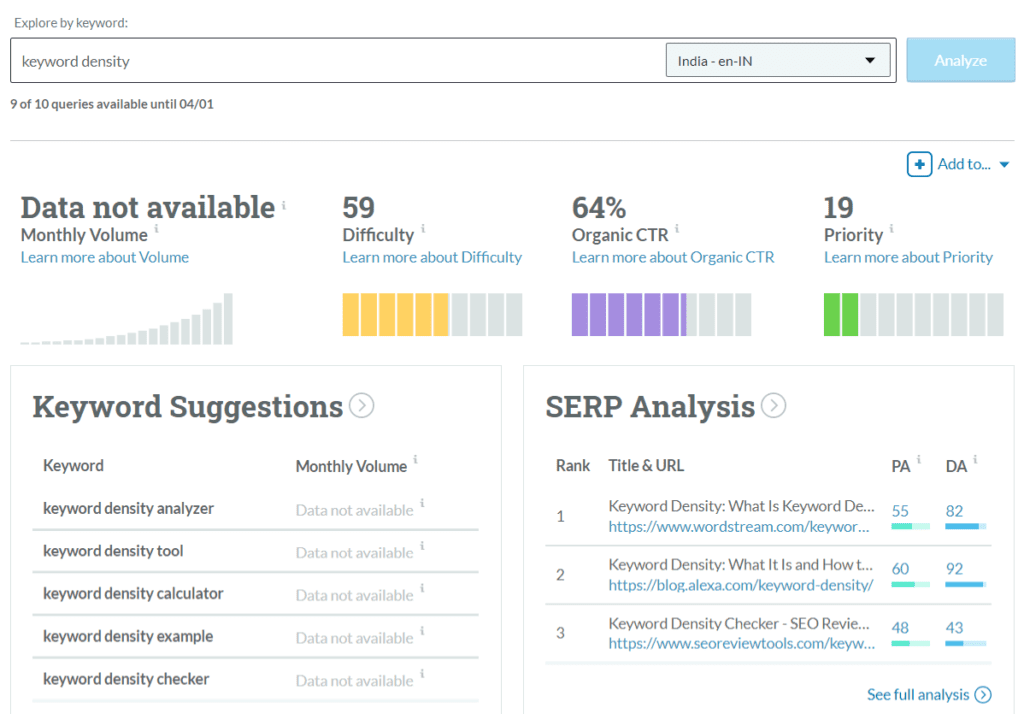Keyword Density – Is It a Google Ranking Factor?

Keyword density is one of the Google ranking factors we hear about quite often. While it’s definitely not as important as good content, backlinks, and other optimization tactics, it can still help you rank higher on search engines if done correctly.
Let’s take a look at keyword density and learn how you can use it to your advantage to improve your site’s ranking in search engines like Google.
What is keyword density?
Keyword density is sometimes also referred to as keyword stuffing, which is when you put too many keywords into one piece of content. That’s not something that SEOs actually worry about—and it’s unlikely that web crawlers do either.
In short, it is the total number of keywords used in any particular piece of content.
While SEOs don’t agree on much, most of them can agree that keyword density is not an important ranking factor. The idea behind it was simple—in fact, it was even simpler than keyword prominence and exact match anchor text: If you use keywords too often in your content, those words will trigger higher relevance scores and cause problems with duplicate content issues. However, that doesn’t seem to be what actually happens—several studies show no correlation between keyword density and rankings.
To make things even more confusing, many SEOs swear by keyword density—and they say it’s an important ranking factor. If you search online for keyword density or read any book on SEO, you’ll find references to them being used as ranking factors—but without data to back it up. I’m not one of those people who swear by keyword density and I don’t think it’s something we should worry about with new sites or pages.
Why consider keywords in your writing?
The number of searches for your keywords will change month to month. Sometimes people have no idea what they want and just start searching randomly. Other times, people can be looking for something very specific, and if you target that word or phrase you can get thousands of visitors per day (yes I’ve seen it first hand). This is also one of many ranking factors in Google.
The second reason you should consider keywords in your writing is website traffic. You want to rank high in search results and keywords are one of many factors used to determine that ranking. If you rank high, you can get thousands of visitors per day. Doesn’t that sound like something you’d like to see on your website analytics every morning?
The third reason you should consider keywords in your writing is that they can help you in building links. If people want to read what you have to say, they’ll link to your content. I don’t know about you, but I’d much rather do some keyword research and write my posts around that instead of trying to build links for certain words and phrases.
The fourth reason you should consider keywords in your writing is that it will help keep you from duplicating the content. We don’t want to publish multiple versions of our website because search engines see that as duplicate content and they could penalize us for it. Instead, we can focus on writing unique posts with different words or phrases in them. That way, if someone searches for something different, we can still rank high for their search term and get new visitors to our site.
The fifth reason you should consider keywords in your writing is that it will help you with your on-page SEO. If you are using keywords in your title tag, in heading tags like H1 and H2 tags, throughout your body content, Meta description, and in metadata (for example image alt text), then search engines will know exactly what they need to do when they index our pages.
I recommend you to check out the 7 SEO-friendly content writing techniques for better ranking in Google.
How do you use keywords in your writing?

Long-tail keywords are used to ensure that a particular site is relevant to its target audience. In order to do so, it’s important to know how often you should use keywords in your writing.
To help with the keyword density of search engines, here are some basic tips for using them effectively:
The importance of keywords is huge. If there is no effective keyword usage on your website and other digital assets, then nobody will find out about your business or brand through search engines.
You should remember that it’s not always a good idea to use any specific word several times in one sentence or paragraph. A very simple rule applies here: if it looks unnatural, don’t do it! When using keywords choose words that are relevant to your product/services but still readable for customers.
Also, avoid excessive use of keywords because they can be recognized by search engine algorithms as spammy content and could have an adverse effect on your SEO campaign.
For example, if you are writing an informational post about the “Best laptops for photographers” and you want to include keywords such as “best laptops” or “laptops for photographers”, then it is best to use them when talking about certain characteristics of your chosen devices. In addition, avoid repeating these words in one paragraph more than 3 times.
The same applies to long-tail keywords, i.e. keyword phrases that include 3 or more words. In such cases, you should use them once in a paragraph, but not overuse them as it may cause an unpleasant effect on your readers and create confusing content for search engines.
You can learn more about how to Find the Perfect keywords for your Blog for better ranking Here.
Does keyword density still matter today?
The short answer is yes, keyword density does matter for SEO. There is some confusion though around what constitutes keyword density and how it’s used today in search engine rankings.
Many SEO experts say it’s not an important ranking factor anymore, but that doesn’t mean you shouldn’t include relevant keywords throughout your content. Here are two things to know about keyword density that will help you leverage SEO for your business
Keyword density is an interesting factor that has evolved over time. It used to be one of Google’s primary ranking factors, but SEO experts agree it plays a less significant role today. That doesn’t mean you shouldn’t use it for SEO though.
While it’s not as important as it once was, keyword density is still an important aspect of your website’s SEO. You can still rank well without focusing on keyword density, but if you want to make sure your content stands out and gets found in search results, adding relevant keywords throughout your content can help. Just don’t go overboard or you could run into problems with over-optimization penalties from Google.
Tools for keyword density analysis
There are many tools to help you analyze your site’s keyword density. One example is Moz Keyword Explorer. This tool allows you to enter up to 10 seed keywords and then shows you how many times those keywords appear on your site, as well as their average keyword density (how often they appear per page).

For example, if you enter “weight loss” as one of your keyword seeds, Keyword Explorer will show you all of your pages that have that keyword on them.
Below those results, Keyword Explorer gives you even more information about that page and its content: how many words there are on the page, how many times each word appears (giving you an idea of what word is most important in optimizing for that keyword), and even statistics for each individual word (like whether it’s all caps or not). This can be helpful for adding more synonyms to your content without making it look spammy.
Best practices to Avoid Keyword Stuffing
If you want to ensure that your copy doesn’t come off as keyword stuffing, you have to remember one thing: your content needs to be useful.
Content should solve problems and provide solutions for readers. If it does that, then it’s clear why it deserves links from others. But if you can’t prove its value to users, then all your keywords in the world won’t save you from being slapped with a penalty by Google.
The best way to avoid being penalized for keyword stuffing is to focus on delivering value. That’s what makes your content compelling, and that’s why people link to it in their own posts. Try implementing a keyword research strategy and then put keywords where they belong—and where they will actually be useful.
Here are some best practices that you should follow.
- Assign a Focus keyword to each Blog post
- Write in-depth articles and cover all aspects of that topic
- Use LSI keywords and long-tail keyword variations in your article.
- Use keywords in key areas like title, meta description, first paragraph, body, image alt-text, etc.
- Write content to solve user queries in focus instead of ranking high in search
- Don’t repeat the same words again and again, instead use synonyms and related words.
Final overview
This post aims to deliver an in-depth investigation into keyword density, what it is, and how it impacts on-page SEO. It is one of the most confused and misunderstood concepts when it comes to keyword optimization.
so, always keep the balance of keyword placement and avoid keyword stuffing for better ranking in SERPs.
If you want me to Optimize the On-page SEO of your website, you can contact me here.





